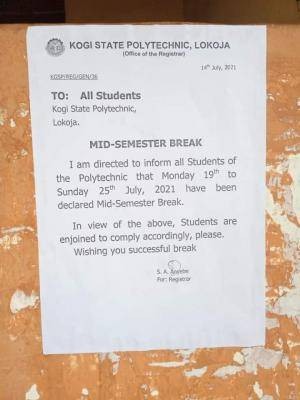
When the Education for All by 2015 Millennium Development Goal was postulated in 2000, skeptics doubted the ability of countries like Nigeria to live up to that goal in a 15-year time frame.
One year to the 2015 deadline, the United Nations Educational Scientific and Cultural Organisation, UNESCO, in a 2014 report, said that it would take more than 70 years before all children will have access to primary education.
The two week-old UNESCO report, based on the latest data which is from 2011, shows that there are still 57 million children who did not even get the first basics of schooling. The greatest problems are in sub-Sahara Africa, with particular weaknesses in parts of West Africa, it added.
Entitled 70 Year- Wait for Primary School, the report says 57 million children, over 10.5 million of whom are Nigerians, remain without schools and at the current rate, it will be 2086 before access is reached for poor, rural African girls. In poor countries, one in four young people is unable to read a single sentence. The study also raises concerns about the quality of education in many poorer countries.
There are 130 million children who remain illiterate and innumerate despite having been in school. It means that a quarter of young people in poorer countries are illiterate, which has far-reaching implications for economic prospects and political stability.
Speaking on the issue, the Special Assistant to the Supervising Minister of Education, Bar. Nyesom Wike, Mr. Lambert Oparah, said, “I don’t know where they got the statistics from but I am particular about Nigeria, especially what the Supervising Minister of Education is doing. Apart from the various restructuring programmes he is undertaking to ensure that our education system is uplifted, he has also ensured that those managing the education system, particularly teachers, are properly trained so that they can effectively impart their knowledge to the students.
“Presently, the Federal Government has demanded that teachers be upgraded and this is being done in collaboration with the Nigeria Teachers’ Institute, Kaduna. In the next couple of years, we will begin to see improved quality of education in Nigeria, given the efforts of the Federal Government towards this effect presently.”
In disagreement is the National Coordinator, Education Rights Campaign, ERC, Mr. Hassan Soweto, who stressed that things are getting worse by the day in the education sector.
“In 2004, there were about 7.3 million out-of-school children, today, there are 10.5 million, while the number of applicants to our universities have increased with no corresponding increase in number of schools.
“According to the 11th Education for All Global Monitoring Report by UNESCO, Nigeria’s education sector faces such a bleak future that it will definitely not meet EFA’s Goals 1, 2 and 4 by the year 2015.
“Furthermore, Nigeria is one of the only 15 countries that the report projects will have fewer than 80 per cent of its primary school age children enrolled by 2015. In addition, Nigeria’s out-of-school population not only grew the most in terms of any country in the world since 2004-2005 by 3.4 million, but also had the 4th highest growth rate.
“Nigeria’s capitalist ruling elite have no shame otherwise there is no reason why a country this blessed should parade this kind of negative indices in the area of education provision. For instance, Nigeria has over 40 million illiterate adults, 53 years after independence when the benefit of education is no more a matter of argument, 40 per cent of our youths are stark illiterates, while 5 per cent of the poorest young women are literates compared to 90 per cent of the richest.
With four years of schooling in Nigeria, less than one in 10 children emerge literate while after 5-6 years in school, less than 30 per cent are able to read even a single sentence. In addition, about 212,000 primary school teachers, 13 per cent of the global total, will be needed between 2011 and 2015 alone to shore up the astounding pupil-teacher ratio.
“These and many more are the crying needs of the sector which the 2014 budgetary allocation to education cannot sufficiently address. If President Jonathan has any concern for public education, this should be the time to put together the resources- though huge- needed to begin to repair the fortunes of our education sector.”
Speaking at the opening ceremony of the training of secondary school teachers in Lagos State, the West African Examinations Council, WAEC, the Head of National Office, HNO, WAEC, Mr. Charles Eguridu, expressed dissatisfaction with the declining performance of students in examinations, which he attributed to drop in the quality of teaching and learning.
“We are very worried about the drop in students’ performance in public examinations and from our analysis, we discovered that there is a general decline in the quality of teaching and learning, and even those assigned with the responsibility of teaching are not properly equipped to do so, and if teachers don’t have the competences to teach the students, there is no way students can perform well.”
On what can be done to improve on the quality of teachers, Eguridu said there needs to be constant training and retraining of teachers to ensure that they are up to speed with global best practices.
“The Council believes that a better informed and equipped teaching force would greatly improve the quality of teaching and learning which will have positive impact on the educational development of Nigeria.
“In response to the dwindling educational standard in Nigeria, we are making this training programme available to all teachers across the country to enable them understand the process of curriculum implementation, be proactive and take initiatives in the use of teaching aids and monitor and evaluate teaching and learning outcomes by managing performance indicators, among others.”
In the same vein, the Vice-President, Colleges of Education Academic Staff Union, COEASU, Mr. Smart Olugbeko, said access to education is beyond just putting children in school as it has to do with the quality of education being provided and the quality of life of the nation’s citizens.
“Even when the schools are free, some parents have to pull their children out of school to help raise money for the family’s basic needs. You don’t expect children to stay in school if they do not have food to eat at home. In the hierarchy of needs, physiological needs such as food and clothing come before every other thing and a lot of Nigerians lack this.
Government must, therefore, seek, as a first priority, the welfare of the people and must also stop all these policy somersaults and give proper funding, and pay more attention to education.
“Our union, COEASU, has been on strike for over a month, yet we haven’t even been called for negotiations. Nobody cares about the situation because it is the common man that attends Colleges of Education.
“Little wonder nobody wants to be a teacher in this country due to its unattractiveness and the way teachers are being treated. If we do not pay more attention to teacher training, the quality of education will definitely suffer.”
An education policy consultant, Mr. Wale Samuel, sums it up by saying education remains at the heart of development; likewise issues around adequate teacher recruitment and training remains at the heart of good education.
“One year to the landmark year of the MDGs, Nigeria lags far behind in the attainment of MDG 2 and unlikely to meet the goal by 2015. Though a major indicator of MDG 2 concerns itself mainly with increasing enrolment, current findings in Nigeria argue that the issue of poor quality plays a key role in enrolment, retention and completion.
“Aside from inadequate teacher training and re-retraining, one of the biggest constraints to achieving MDG 2 in Nigeria – and the critical reason why massive increases in enrolments are not guaranteeing children a quality education – is the failure to deal with the huge gap in professional, well-supported teachers. Of the 139 countries reporting UNESCO data for 2010, three would need to recruit more than 200,000 teachers in total by the year 2015.
“Consequently, it could be argued that for the MDG 2 to be achieved and the right to primary education for every child realised, much improved training and support for teachers is needed. Several interventions that have focused on improved teacher pupil relationship have helped pupil retention in schools but this can only be very effective where teachers are trained and motivated to do so.”




